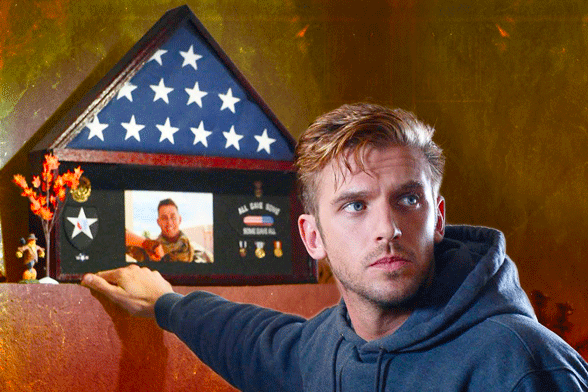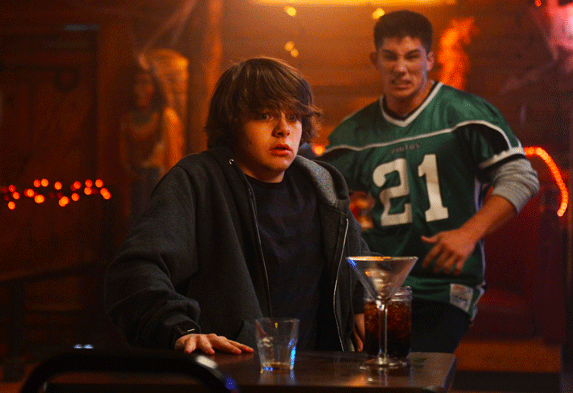The 20th anniversary of September 11th was an appropriately solemn occasion, with presidents Biden, Obama and Clinton making appearances at Ground Zero. Trump spent time not far from his Plaza with Bernie Kerick, and George W. Bush made a speech in Shanksville, PA likening the 9/11 hijackers with the January 6th Capital Rioters.
The media appeared elated with Bush’s speech. Mike Prysner, a veteran of the Iraq war, was less enthused.
Prysner spoke out at a Distinguished Speaker Series event in Beverly Hills on September 19th. “You lied about weapons of mass destruction, you lied about connections to 9/11. You lied about Iraq being a threat. You sent me to Iraq. You sent me to Iraq in 2003. My friends are dead,” Prysner screamed before security escorted him out.
Americans never processed that war. Now, with the hastily thrown together withdrawal in Afghanistan, the invasion of Iraq is treated by the media like nothing more than a strange detour. In light of the United Nations Sustainable Development Goal on Peace, Justice, and Strong Institutions, both Iraq and Afghanistan should be heavy on everyone’s conscience.
Iraq is barely mentioned, though its orchestrators are featured frequently as talking heads on CNN or as looming, Rumsfeld-shaped ghosts. The loss of Phil Donahue's career and journalist Michael Kelly's life are distant memories. Kelly’s passing, the first journalist killed in Iraq, is a fact that is only post-scripted in Shattered Glass, a 2003 film about a disgraced journalist.
Just as importantly (if not much more), the estimated number of dead Iraqis, Americans and others vary so wildly that it’s difficult to get an accurate tally. The Iraq War Body Count Project estimates somewhere between 185,000 to 208,000 civilians died violently, but the numbers are still a matter of some dispute in part to large amounts of undercounting.
To rehash the lead-up to the invasion in March 2003 would almost feel like overkill if it weren't painfully obvious that much of the West had forgotten it, dismissed it or moved on.
The most concise, thorough record of the entire war, beginning with the United States' first invasion a decade earlier, can be found in journalists Noah Kulwin and Brendan James’ excellent podcast Blowback. In it, the two discuss the recent rehabilitation of figures like George W. Bush and the late Donald Rumsfeld.
"The Obama years and the Trump administration have put so much distance in American minds between what was happening then and what is happening now," said Kulwin.
The seeming memory lapse about Iraq we now live in has caused us to forget important details about the figures who succeeded them, who continued the campaign of drone strikes and assassinations in Iraq until at least last year.
Strangely, you'd have to go pretty far to the right of centre in the media landscape to find anyone still making the argument that Bush, Cheney and Colin Powell didn't lie about Saddam Hussein having weapons of mass destruction or providing aid to the 9/11 hijackers. Here are a few.
Yet, Bush is slowly being welcomed into the political sphere once again, largely thanks to what came after — and, ironically, because he paints pictures of the very immigrants his policies tormented. It is something worth considering before he starts appearing on CNN as a commentator, certainly as Prysner’s words fell on deaf ears despite going viral.
A lot of the anger, paranoia and fear sparked by the Vietnam outrage was translated into films released both during and after the conflict. America didn’t have the same reaction to their time in Iraq or Afghanistan — not yet — so rather than First Blood or Taxi Driver, we get The Guest.

The Guest has little to do with the politics of the Iraq or Afghanistan war, much like its soldiers. Instead, it focuses on something more familiar to postwar media — the debris. It is a horror-thriller, and it's great fun for anyone who lived in the heyday of the 80s slasher. Director Adam Wingard doesn't hold back on paying tribute to the works of John Carpenter.
The Guest first pays tribute to another film about veterans, with shots of the titular character, David (Dan Stevens) running down a lonely road, bag over his shoulder. But this Rambo is not the sad, troubled Vietnam veteran who was drafted into a battle he never believed in.
Wingard is smart enough not to specify the conflict (though the timeline fits), but that’s kind of the point. “The Middle East'' is all David calls it, like a character in a 90s film, and the titular guest is happy to remain unspecific. It’s not as if it’s uncommon to lump the conflicts together.
Stevens is a devastatingly handsome actor, and Wingard plays on his sensitive, boyish charm and looks when he comes to the door of Laura Peterson’s (Sheila Kelly) home. Part of keeping his origins vague is built into the film’s mystery, which could have come from either conflict.
David is seemingly sweet and kind when he comes to deliver the last words of a fallen soldier to his parents, and it’s no surprise when he’s invited to stay in their home.
The weak-willed patriarch with a developing drinking problem (Leland Orser, always a pleasure) takes a liking to the cut of his jib, and the son (Brendan Meyer) certainly doesn’t mind the help he gets with local bullies.

“Bring a knife to school,” David tells the preteen. “If they take it off you and beat you up, you go around their houses at night and burn ‘em down with their families inside. What’s the worst they can do?”
It isn’t solid parenting, but it appears to be more than he’s getting from his father. The only one who feels somewhat uneasy is Anna (Maika Monroe). Nonetheless, she’s forced to take him to a high school party.
It is at the party where David’s true nature is first hinted, when a stoner kid (Joel David Moore) tries to claim he “supports the troops” without much conviction. It is difficult to discuss The Guest without revealing much, but David’s origins begin to become all-too-apparent to Anna, despite the rest of her family’s obliviousness.
It helps that Wingard carries the film with such commitment to retro. The Carpenteresque, pulsating synthesizer score in the early scenes makes Stevens’ performance just the right amount of unsettling.
The film is also exceptionally well-paced, making exclamations in tiny bursts of violence. The violence is jarring, though it’s prepping us for a bloodbath that lies in wait. Anna’s suspicions lead her to contact the military (Lance Reddick), who immediately calls in “shooters” to fix the situation.
David’s origins are vague, but they’re clear enough that it’s not difficult to imagine the conditioning he must have undergone in the military — the same given to people like the Trump-pardoned Eddie Gallagher, whose colleagues once referred to him as “freaking evil.” It’s also not hard to see a guy like Gallagher enacting a similar protocol, or at the very least wanting to.
Of course, Wingard and company aren’t that interested in subtext once the horrors begin, and the film’s true influences overtake the story. By the end, David is stalking teens in a haunted carnival maze, and it’s the kind of frightening, Halloween treat it wants to be.
The Guest was released in 2014, and one couldn’t imagine a world where it could have been financed sooner. Back in the days of Iraq, the running joke in Hollywood appeared to be that if you wanted to lose money, make a movie about the war. Films like Green Zone and Body of Lies had all the impact of a hangover on a chronic alcoholic.
The Guest’s conflict was supported despite the lies, and he wasn’t forced to fight it. It’s hard to side with Rambo when you realize he may have been responsible for Abu Ghraib or worse, though maybe we’re still pointing the wrong fingers at the wrong targets.
The Iraq and Afghanistan conflicts, as well as the bodies and minds lost to them, are far too great to be reckoned with in a minor article, nor should it be attempted. For that, visit the podcast mentioned earlier here. Further reading can also be found at The Iraq Body Count Project and for more on Sustainable Development Goal 16, click here.
